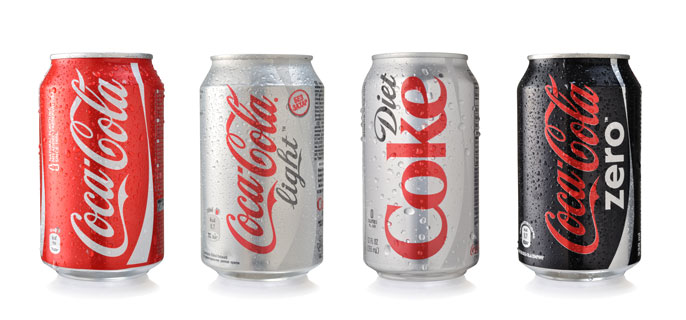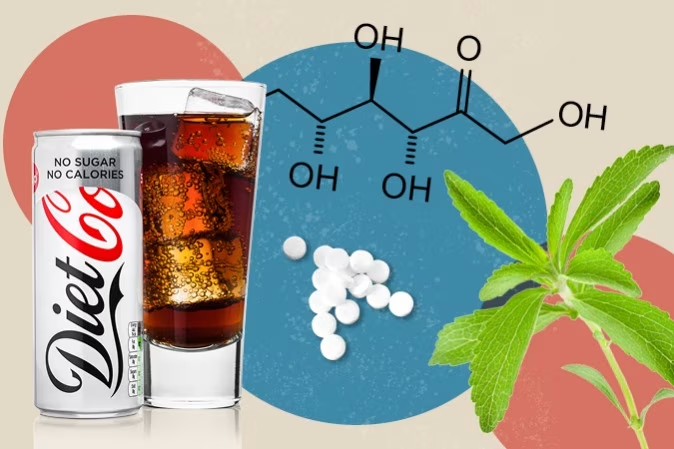Diet Coke, the iconic zero-sugar soda, has been a staple for millions seeking a guilt-free fizz. With its crisp taste and zero-calorie promise, it’s no wonder why it’s a go-to for those watching their waistlines or simply craving a refreshing drink. But whispers about the health impacts of artificial sweeteners like aspartame, the primary sweetener in Diet Coke, have sparked debates: Is Diet Coke bad for you? At https://tastetrove.net/, we’re diving into the science, myths, and truths about artificial sweeteners to help you make informed choices about what you sip.
What’s in Diet Coke?
Diet Coke’s allure lies in its simplicity: zero sugar, zero calories, and a bubbly kick. Its primary ingredients include:
- Carbonated water: The fizzy base.
- Aspartame: An artificial sweetener about 200 times sweeter than sugar.
- Caramel color: For that classic cola hue.
- Phosphoric acid: Adds tanginess and acts as a preservative.
- Caffeine: About 46 mg per 12-ounce can, roughly half a cup of coffee.
- Natural flavors: A proprietary blend for taste.
Aspartame is the star of the show and the source of most controversy. Let’s explore what it is and why it’s under scrutiny.

Understanding Artificial Sweeteners
Artificial sweeteners like aspartame, sucralose, and saccharin are synthetic compounds designed to mimic sugar’s sweetness without the calories. Aspartame, discovered in 1965, is made from two amino acids: aspartic acid and phenylalanine. It’s found not only in Diet Coke but also in thousands of products, from sugar-free gum to yogurt.
Unlike sugar, which provides 4 calories per gram, aspartame is virtually calorie-free, making it a darling of the diet industry. But its widespread use has led to questions about safety, with concerns ranging from weight gain to cancer risks. To get to the truth, we need to look at the science.
The Safety of Aspartame: What Does the Research Say?
The U.S. Food and Drug Administration (FDA) has set an acceptable daily intake (ADI) for aspartame at 50 milligrams per kilogram of body weight. For a 150-pound (68 kg) person, that’s about 3,400 mg, or roughly 18 cans of Diet Coke per day. Most people consume far less—typically under 5 mg per kg daily.
Cancer Concerns
One of the most persistent myths is that aspartame causes cancer. This fear stems from early animal studies, particularly a 2006 study by the Ramazzini Institute in Italy, which linked aspartame to leukemia and lymphoma in rats. However, the study’s methodology was criticized for poor controls and high doses far exceeding human consumption levels.
Decades of research, including reviews by the National Cancer Institute and the European Food Safety Authority (EFSA), have found no consistent evidence linking aspartame to cancer in humans. A 2023 World Health Organization (WHO) report classified aspartame as “possibly carcinogenic” (Group 2B), but this designation reflects limited evidence and is more about hazard identification than real-world risk. For context, pickled vegetables and aloe vera share the same classification.
Neurological Effects
Another concern is aspartame’s impact on the brain. Critics claim it may cause headaches, seizures, or mood disorders due to its breakdown into phenylalanine, aspartic acid, and methanol. However, these components are present in many foods. For example, a glass of tomato juice contains more methanol than a can of Diet Coke.
A 2017 meta-analysis in Critical Reviews in Toxicology examined over 100 studies and found no significant evidence that aspartame causes neurological issues in healthy individuals. However, people with phenylketonuria (PKU), a rare genetic disorder, must avoid aspartame because they cannot metabolize phenylalanine. Diet Coke cans carry a warning for this group.
Weight Management
Diet Coke is marketed as a weight-loss-friendly drink, but does it deliver? Some studies suggest artificial sweeteners may disrupt appetite regulation by confusing the brain’s reward system, potentially leading to increased hunger. A 2016 study in Physiology & Behavior found that rats given aspartame consumed more calories overall compared to those given sugar.
Yet, human studies are mixed. A 2020 review in The American Journal of Clinical Nutrition found that replacing sugary drinks with diet versions like Diet Coke can reduce overall calorie intake and support weight loss, especially in structured diet plans. The catch? Behavioral factors, like overcompensating with high-calorie foods, can negate these benefits. Check out our guide on Healthy Snacking Habits for tips on balancing your diet.
Other Health Considerations
Gut Health
Emerging research has explored how artificial sweeteners affect gut microbiota. A 2018 study in Molecules suggested that aspartame may alter gut bacteria in rats, potentially affecting metabolism. Human studies are less conclusive, but a 2022 review in Nature noted that some sweeteners, including saccharin, may disrupt gut flora in certain individuals. The impact of Diet Coke specifically remains unclear, but moderation is key.
Bone Health
The phosphoric acid in Diet Coke has raised concerns about bone health, as high phosphorus intake may interfere with calcium absorption. A 2006 study in The American Journal of Clinical Nutrition linked cola consumption (not specifically Diet Coke) to lower bone density in women. However, the effect was small and not seen in men. Ensuring adequate calcium intake, as discussed in our article on Calcium-Rich Foods, can mitigate potential risks.
Caffeine Content
With 46 mg of caffeine per can, Diet Coke’s caffeine content is moderate but can add up with multiple servings. Excessive caffeine may cause jitteriness, insomnia, or increased heart rate in sensitive individuals. Our piece on Caffeine and Your Body dives deeper into managing intake.
Environmental and Ethical Considerations
Beyond health, Diet Coke’s production and packaging raise questions. Aluminum cans are recyclable, but their production is energy-intensive. The Coca-Cola Company has pledged to make all packaging recyclable by 2030, but progress is ongoing. Additionally, aspartame production involves chemical processes that may have environmental impacts. For eco-conscious readers, our guide on Sustainable Food Choices offers ways to reduce your footprint.
The Moderation Mindset
So, is Diet Coke bad for you? The evidence suggests that for most people, moderate consumption—say, a can or two per day—is unlikely to cause harm. Regulatory bodies like the FDA and EFSA have deemed aspartame safe within established limits, and decades of research have debunked many myths. However, individual responses vary. Some may experience digestive discomfort or cravings, while others tolerate it well.
The bigger picture is balance. Relying on Diet Coke as a primary hydration source or a weight-loss crutch can backfire. Water, herbal teas, or naturally flavored seltzers are better staples. Our article on Hydration Hacks offers creative ways to stay hydrated without artificial sweeteners.
Alternatives to Diet Coke
If you’re looking to cut back, consider these options:
- Sparkling water: Brands like LaCroix offer flavor without sweeteners.
- Infused water: Add fruit or herbs for a natural twist. See our Infused Water Recipes.
- Stevia-based drinks: Stevia, a plant-derived sweetener, is a natural alternative, though it has its own taste profile.
- Homemade iced tea: Control the sweetness with honey or fruit.
The Bottom Line
Diet Coke, like any food or drink, isn’t inherently “bad” or “good.” Its artificial sweetener, aspartame, is safe for most people in moderation, backed by extensive research from trusted authorities. Potential downsides, like gut health impacts or appetite changes, depend on individual factors and consumption habits. At Tastetrove, we believe in informed choices. Enjoy Diet Coke as a treat, but diversify your drinks to include whole, nutrient-rich options.
Got questions about other beverages? Explore our Beverage Guide or join the conversation on X to share your thoughts on Diet Coke and artificial sweeteners!
References:
- National Cancer Institute: Aspartame and Cancer
- EFSA: Aspartame Safety Assessment
- Critical Reviews in Toxicology, 2017
- Physiology & Behavior, 2016
- The American Journal of Clinical Nutrition, 2020
- Molecules, 2018
- Nature, 2022

Is Diet Coke Bad for You? The Truth About Artificial Sweeteners
Diet Coke, the iconic zero-sugar soda, has been a staple for millions seeking a guilt-free fizz. With its crisp taste and zero-calorie promise, it’s no wonder why it’s a go-to for those watching their waistlines or simply craving a refreshing drink. But whispers about the health impacts of artificial sweeteners like aspartame, the primary sweetener in Diet Coke, have sparked debates: Is Diet Coke bad for you? At Tastetrove, we’re diving into the science, myths, and truths about artificial sweeteners to help you make informed choices about what you sip.
What’s in Diet Coke?
Diet Coke’s allure lies in its simplicity: zero sugar, zero calories, and a bubbly kick. Its primary ingredients include:
- Carbonated water: The fizzy base.
- Aspartame: An artificial sweetener about 200 times sweeter than sugar.
- Caramel color: For that classic cola hue.
- Phosphoric acid: Adds tanginess and acts as a preservative.
- Caffeine: About 46 mg per 12-ounce can, roughly half a cup of coffee.
- Natural flavors: A proprietary blend for taste.
Aspartame is the star of the show and the source of most controversy. Let’s explore what it is and why it’s under scrutiny.
Understanding Artificial Sweeteners
Artificial sweeteners like aspartame, sucralose, and saccharin are synthetic compounds designed to mimic sugar’s sweetness without the calories. Aspartame, discovered in 1965, is made from two amino acids: aspartic acid and phenylalanine. It’s found not only in Diet Coke but also in thousands of products, from sugar-free gum to yogurt.
Unlike sugar, which provides 4 calories per gram, aspartame is virtually calorie-free, making it a darling of the diet industry. But its widespread use has led to questions about safety, with concerns ranging from weight gain to cancer risks. To get to the truth, we need to look at the science.
The Safety of Aspartame: What Does the Research Say?
The U.S. Food and Drug Administration (FDA) has set an acceptable daily intake (ADI) for aspartame at 50 milligrams per kilogram of body weight. For a 150-pound (68 kg) person, that’s about 3,400 mg, or roughly 18 cans of Diet Coke per day. Most people consume far less—typically under 5 mg per kg daily.
Cancer Concerns
One of the most persistent myths is that aspartame causes cancer. This fear stems from early animal studies, particularly a 2006 study by the Ramazzini Institute in Italy, which linked aspartame to leukemia and lymphoma in rats. However, the study’s methodology was criticized for poor controls and high doses far exceeding human consumption levels.
Decades of research, including reviews by the National Cancer Institute and the European Food Safety Authority (EFSA), have found no consistent evidence linking aspartame to cancer in humans. A 2023 World Health Organization (WHO) report classified aspartame as “possibly carcinogenic” (Group 2B), but this designation reflects limited evidence and is more about hazard identification than real-world risk. For context, pickled vegetables and aloe vera share the same classification.
Neurological Effects
Another concern is aspartame’s impact on the brain. Critics claim it may cause headaches, seizures, or mood disorders due to its breakdown into phenylalanine, aspartic acid, and methanol. However, these components are present in many foods. For example, a glass of tomato juice contains more methanol than a can of Diet Coke.
A 2017 meta-analysis in Critical Reviews in Toxicology examined over 100 studies and found no significant evidence that aspartame causes neurological issues in healthy individuals. However, people with phenylketonuria (PKU), a rare genetic disorder, must avoid aspartame because they cannot metabolize phenylalanine. Diet Coke cans carry a warning for this group.
Weight Management
Diet Coke is marketed as a weight-loss-friendly drink, but does it deliver? Some studies suggest artificial sweeteners may disrupt appetite regulation by confusing the brain’s reward system, potentially leading to increased hunger. A 2016 study in Physiology & Behavior found that rats given aspartame consumed more calories overall compared to those given sugar.
Yet, human studies are mixed. A 2020 review in The American Journal of Clinical Nutrition found that replacing sugary drinks with diet versions like Diet Coke can reduce overall calorie intake and support weight loss, especially in structured diet plans. The catch? Behavioral factors, like overcompensating with high-calorie foods, can negate these benefits. Check out our guide on Healthy Snacking Habits for tips on balancing your diet.
Other Health Considerations
Gut Health
Emerging research has explored how artificial sweeteners affect gut microbiota. A 2018 study in Molecules suggested that aspartame may alter gut bacteria in rats, potentially affecting metabolism. Human studies are less conclusive, but a 2022 review in Nature noted that some sweeteners, including saccharin, may disrupt gut flora in certain individuals. The impact of Diet Coke specifically remains unclear, but moderation is key.
Bone Health
The phosphoric acid in Diet Coke has raised concerns about bone health, as high phosphorus intake may interfere with calcium absorption. A 2006 study in The American Journal of Clinical Nutrition linked cola consumption (not specifically Diet Coke) to lower bone density in women. However, the effect was small and not seen in men. Ensuring adequate calcium intake, as discussed in our article on Calcium-Rich Foods, can mitigate potential risks.
Caffeine Content
With 46 mg of caffeine per can, Diet Coke’s caffeine content is moderate but can add up with multiple servings. Excessive caffeine may cause jitteriness, insomnia, or increased heart rate in sensitive individuals. Our piece on Caffeine and Your Body dives deeper into managing intake.
Environmental and Ethical Considerations
Beyond health, Diet Coke’s production and packaging raise questions. Aluminum cans are recyclable, but their production is energy-intensive. The Coca-Cola Company has pledged to make all packaging recyclable by 2030, but progress is ongoing. Additionally, aspartame production involves chemical processes that may have environmental impacts. For eco-conscious readers, our guide on Sustainable Food Choices offers ways to reduce your footprint.
The Moderation Mindset
So, is Diet Coke bad for you? The evidence suggests that for most people, moderate consumption—say, a can or two per day—is unlikely to cause harm. Regulatory bodies like the FDA and EFSA have deemed aspartame safe within established limits, and decades of research have debunked many myths. However, individual responses vary. Some may experience digestive discomfort or cravings, while others tolerate it well.
The bigger picture is balance. Relying on Diet Coke as a primary hydration source or a weight-loss crutch can backfire. Water, herbal teas, or naturally flavored seltzers are better staples. Our article on Hydration Hacks offers creative ways to stay hydrated without artificial sweeteners.
Alternatives to Diet Coke
If you’re looking to cut back, consider these options:
- Sparkling water: Brands like LaCroix offer flavor without sweeteners.
- Infused water: Add fruit or herbs for a natural twist. See our Infused Water Recipes.
- Stevia-based drinks: Stevia, a plant-derived sweetener, is a natural alternative, though it has its own taste profile.
- Homemade iced tea: Control the sweetness with honey or fruit.
Recommended Products
Looking for healthier swaps or Diet Coke staples? Here are some Tastetrove-approved picks:
- Diet Coke 12-Pack: The classic, if you’re sticking with it in moderation. Affordable and widely available.
- LaCroix Sparkling Water Variety Pack: Zero calories, zero sweeteners—just pure fizz and natural flavors. Perfect for easing off sodas.
- Zevia Cola: Sweetened with stevia, this zero-calorie cola mimics the real thing without aspartame.
- Liquid I.V. Hydration Multiplier: For when you need electrolytes without the fizz—mix with water for a nutrient boost.
- Philz Coffee Cold Brew: A caffeine hit without the soda, customizable and fresh-brewed.
Affiliate links: Tastetrove may earn a commission from purchases made through these links at no extra cost to you.
Frequently Asked Questions (FAQs)
1. Does Diet Coke cause cancer?
No strong evidence supports this in humans. The WHO’s 2023 classification as “possibly carcinogenic” is based on limited animal data and doesn’t indicate a significant risk at typical consumption levels. For more, see the National Cancer Institute.
2. Can I drink Diet Coke every day?
In moderation, yes—for most adults, 1-2 cans daily is well within safe limits. But listen to your body; if it causes headaches or bloating, cut back. Pregnant individuals should consult a doctor due to caffeine.
3. Are artificial sweeteners better than sugar?
They can be for calorie control, but neither is “better” in excess. Sugar spikes blood glucose; sweeteners may affect gut health. Aim for whole foods over processed drinks.
4. What are the side effects of aspartame?
Rare in healthy people, but possible mild effects include headaches or digestive upset. Those with PKU must avoid it entirely.
5. Is Diet Coke bad for your teeth?
Less so than regular Coke, as it lacks sugar. But the acidity can still erode enamel—rinse with water after drinking.
6. How does Diet Coke affect weight loss?
It can help by cutting calories, but some studies suggest it might increase cravings. Pair it with a balanced diet for best results.
7. Are there natural alternatives to aspartame?
Yes! Stevia, monk fruit, and allulose are plant-based options. Check labels on products like Zevia or Bubly.
The Bottom Line
Diet Coke, like any food or drink, isn’t inherently “bad” or “good.” Its artificial sweetener, aspartame, is safe for most people in moderation, backed by extensive research from trusted authorities. Potential downsides, like gut health impacts or appetite changes, depend on individual factors and consumption habits. At Tastetrove, we believe in informed choices. Enjoy Diet Coke as a treat, but diversify your drinks to include whole, nutrient-rich options.
Got questions about other beverages? Explore our Beverage Guide or join the conversation on X to share your thoughts on Diet Coke and artificial sweeteners!

References:
- National Cancer Institute: Aspartame and Cancer
- EFSA: Aspartame Safety Assessment
- Critical Reviews in Toxicology, 2017
- Physiology & Behavior, 2016
- The American Journal of Clinical Nutrition, 2020
- Molecules, 2018
- Nature, 2022